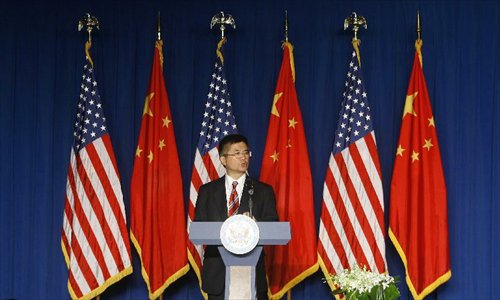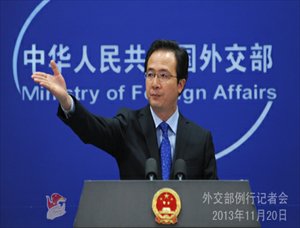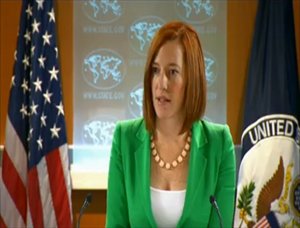HOME >>
Gary Locke, US Ambassador to China, resigns after 2 years
Source:Globaltimes.cn Published: 2013-11-21 17:29:00
| Latest News |
Gary Locke, the first American of Chinese descent to head the US Embassy in Beijing and who sparked intensive controversy during his two-and-half-year tenure, will step down as ambassador in early 2014, the embassy said in a statement Wednesday.
China appreciates Gary Locke's tenure
Chinese Foreign Ministry spokesman Hong Lei said Wednesday that China appreciates Locke's positive efforts to promote China-US exchanges and cooperation.
US Ambassador Gary Locke resigns to join his family
Locke’s official announcement appeared in the Hong Kong-based South China Morning Post, in which he said that serving as the US ambassador to China has been the honor of a lifetime and living in China while representing the US has truly been an exciting privilege for his entire family.
| Reactions |
| Resignation statement |
More
| Commentary |
Global Times:
US Ambassador to China to step down
Locke has engaged in public opinion disputes, faced with the strategic bilateral relationship between the two countries and the fact that Chinese society is undergoing a transformation, Lu Shiwei, a senior research fellow with Institute of Modern International Relations of Tsinghua University, told the Global Times.
"As China is developing rapidly and the US has been suffering a financial crisis, America takes a strategy of keeping an eye on the Asia-Pacific region and expanding investment into it to boost its influence and position," Lu said. "America has an agenda to let China develop in the direction that America wants, and an important tool is to use soft power."
Locke controversy stems from Chinese expectation
Looking back, Locke is a "normal" US Ambassador to China. The unusual stand and image of him in the eyes of Chinese public in fact stem from Chinese expectations. Chinese public opinion should become more mature after taking a close look at Locke for over two years. The Chinese public needs to deepen their understanding of national interests. Locke's Chinese American identity and affable face made some take him as "Chinese." However, he soon displayed his loyalty to US national interests.
Locke and the US Embassy caused some awkward situations for China. But they also have become part of the reasons to drive China to reform. Locke has made us fully aware how easily American elements could affect China's grass-roots society and how easily China's internal problems could be politicized in light of a big gap between Chinese and American soft power.
Beijing Morning Post:
Jin Canrong, deputy director of the School of International Studies at Renmin University of China
Gary Locke, only in his early 60s, will not likely return to the US and simply live in retirement. He will probably make a bid for the next US presidential election. As former governor of Washington, Secretary of Commerce and US Ambassador to China, he has experience working in both local and central government. He also has experience with foreign affairs. Even if he was defeated in the presidential election, he could run for vice president.
Oriental Morning Post:
Shen Yi, lecturer with the School of International Relations and Public Affairs at Fudan University
The next US Ambassador to China will face two challenges: Whether that person can forego stereotypes and provide informed, neutral advice to help the US better understand China, and whether that person is capable of communicating with the Chinese public.
Foreign media:
The Washington Post
US Ambassador to China Gary Locke to step down, rejoin family in Seattle
Douglas Paal, vice president for studies at the Carnegie Endowment for International Peace in Washington, said Locke should be applauded for the visa progress. At the same time, he said, it was “not evident” that the ambassador had a grand strategic vision for the U.S.-China relationship.
Locke suffered somewhat for his Chinese heritage, something that did not necessarily boost his authority with officials here, Paal said. “That plays well in the United States but doesn’t translate in the host environment. They don’t treat you as an equal in China.”
Los Angeles Times
US Ambassador to China Gary Locke to resign
"He didn’t do as much talking as some of his predecessors, but he had a very distinguished working style that people respected. I found him very impressive and skillful,’" said Shi Yinhong, director of the American studies program at Beijing’s Renmin University. "It is quite surprising."
| Profile |
 |
|
| Jan.21,1950 | Locke was born into an immigrant family in Seattle. |
| In 1968 | Locke graduated with honors from Seattle's Franklin High School. |
| In 1972 | Locke earned a bachelor's degree in political science from Yale University. |
| In 1975 | Locke earned a law degree from Boston University. |
| In 1982 | Locke was elected to the Washington State House of Representatives, where he served on the House Judiciary and Appropriations committees, with his final five years there spent as chairman of the House Appropriations Committee. |
| In 1993 | Locke served as chief executive of King County. |
| 1996-2005 | Locke was elected Washington state governor, making him the first Chinese-American governor in US history. |
| 2005-2009 | Locke joined the Seattle office of the international law firm Davis Wright Tremaine LLP, where he co-chaired the firm's China practice and was active in its governmental relations practice. |
| 2009-2011 | Locke was appointed by President Obama as the 36th Secretary of Commerce. |
| 2011-present | Ambassador of the United States of America to China. |
| Related News |
China demands US apology in Chen case
Posted in:

